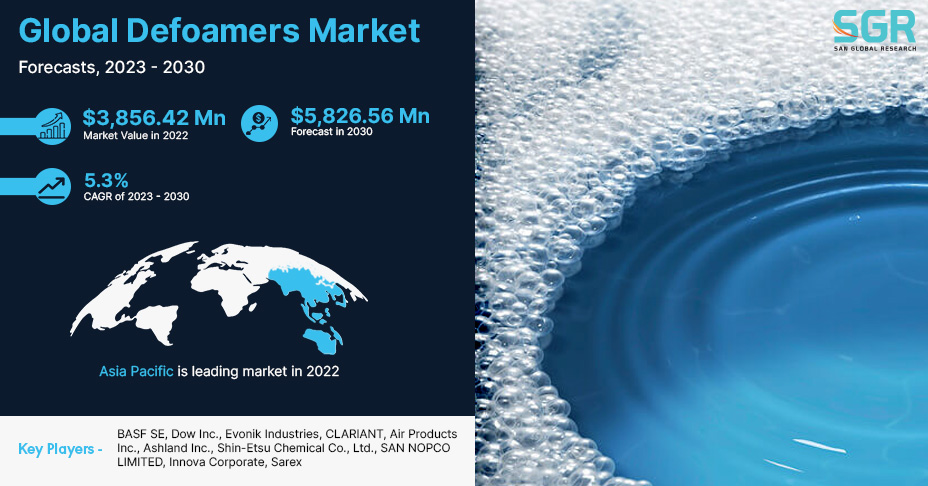The Duty of Defoamers in Enhancing Item Top Quality and Performance
Defoamers serve as important ingredients that alleviate this issue, guaranteeing smoother manufacturing operations while improving the practical and visual features of the final products. The selection of the proper defoamer can be vital to attaining ideal results, elevating essential inquiries about solution compatibility and performance metrics that warrant further expedition.
Comprehending Defoamers
Understanding the duty of defoamers is important for keeping product top quality across different sectors. Defoamers are chemical additives made to reduce and stop the formation of foam in liquid systems, which can detrimentally affect procedures such as blending, filling, and surface tension. Frothing can lead to ineffectiveness, product flaws, and jeopardized visual allure, making defoamers a vital element in producing procedures.
In commercial applications, defoamers assist to improve item consistency and stability. The reliable use of defoamers not just makes sure smoother production procedures but likewise adds to premium item efficiency.
Additionally, the choice and formulation of a defoamer must straighten with certain application demands, such as compatibility with other active ingredients, performance under varying temperature and pH problems, and prospective regulatory restraints. Inevitably, comprehending defoamers' features and their value in various formulations is critical for enhancing production and making certain the finest quality output.
Types of Defoamers
Defoamers can be categorized into numerous types based upon their structure and mechanism of action. The key types consist of silicone-based, non-silicone organic, and not natural defoamers.
Silicone-based defoamers are among one of the most effective, largely due to their capability to spread out swiftly on the liquid surface area and interrupt foam development. Their distinct chemical framework permits for premium stability, making them appropriate for high-temperature applications and settings with differing pH levels.
Non-silicone natural defoamers, frequently made up of all-natural oils or fatty acids, are valued for their biodegradability and reduced poisoning. These are typically utilized in food and drink applications where safety and environmental effect are extremely important.
Inorganic defoamers, that include materials like talc or calcium carbonate, act by increasing the density of the liquid, consequently lowering foam stability. They are frequently used in commercial procedures where compatibility with various other products is not an issue.
Each sort of defoamer has distinctive advantages and limitations, permitting customized services depending on the particular frothing concerns encountered in various applications. Understanding these distinctions is essential for enhancing performance and attaining wanted product high quality.
Applications Across Industries
Numerous sectors leverage defoamers to improve product top quality and functional performance. In the food and drink market, defoamers are vital in processes such as brewing and dairy products production to prevent foam development, which can cause inadequacies and item disparity. By controlling foam, suppliers can guarantee far better yield and a much more uniform product.
In the pharmaceutical market, defoamers play a crucial duty in the formula of fluid drugs, where extreme foam can impede blending and precise application. Their use helps maintain the stability of the formulations and promotes smoother manufacturing processes.
The paint and read this article coverings sector likewise counts on defoamers to boost the performance of items during application. By lessening foam, these additives ensure a smoother surface and boost the aesthetic top qualities of the final product.

Benefits of Utilizing Defoamers
While the application of defoamers varies throughout sectors, their benefits consistently boost product high quality and process performance. One considerable benefit is the reduction of foam formation during making processes, which can or else lead to production delays and variances in product high quality. By lessening foam, defoamers allow a smoother circulation of materials, promoting much more efficient procedures and reducing the probability of equipment malfunctions.
Furthermore, the use of defoamers can enhance the look and texture of end products. In fields such as coverings, paints, and food processing, too much foam can jeopardize the visual aesthetics and overall top quality, while the proper defoamer application ensures a consistent coating and desirable qualities. Defoamers can add to set you back savings by lowering waste throughout manufacturing and maximizing the usage of raw materials.

Choosing the Right Defoamer
Picking the right defoamer is important for optimizing production processes and making sure item top quality. The choice of defoamer influences not only the efficiency of foam control yet additionally the general efficiency attributes of the last item. Elements to think about consist of the kind of application, the chemistry of the formula, and the environmental conditions under which the product will be used.
Different sectors may visit here require specific defoamer kinds, such as silicone-based, natural, or polymeric defoamers. Understanding the compatibility of the defoamer with the primary ingredients is vital to prevent negative responses that can jeopardize product integrity. Additionally, the defoamer's efficiency in different temperatures and pH degrees have to be assessed to make sure consistent efficiency.
Testing the defoamer in small applications can offer beneficial understandings into its performance and viability. Consideration of regulative conformity, especially in food, pharmaceuticals, and cosmetics, is paramount in choosing a defoamer. Inevitably, a thorough analysis of he has a good point these factors will cause the option of a defoamer that not just controls foam successfully yet also improves the high quality and performance of the end product.
Conclusion

To conclude, defoamers are important ingredients that dramatically boost item top quality and performance throughout different markets. By successfully lowering foam formation, these agents not only enhance operational efficiency however additionally add to the useful and visual integrity of items. The critical option and application of defoamers cause cost savings, optimized source usage, and boosted client complete satisfaction. In general, the significance of defoamers in industrial procedures can not be overstated, as they play an essential duty in accomplishing constant and top quality results.
Frothing can lead to inefficiencies, item issues, and jeopardized aesthetic allure, making defoamers a crucial component in producing operations.
Comments on “How Defoamers Improve Product Quality and Reduce Waste in Production”